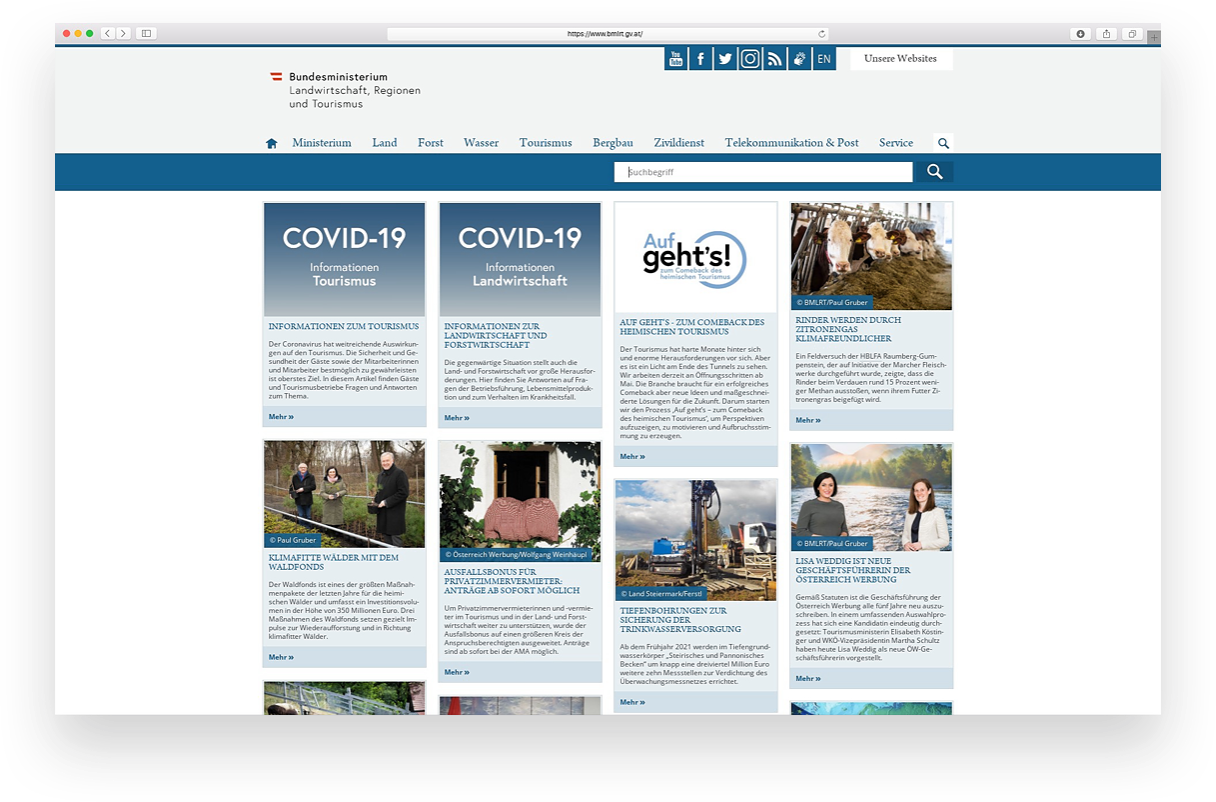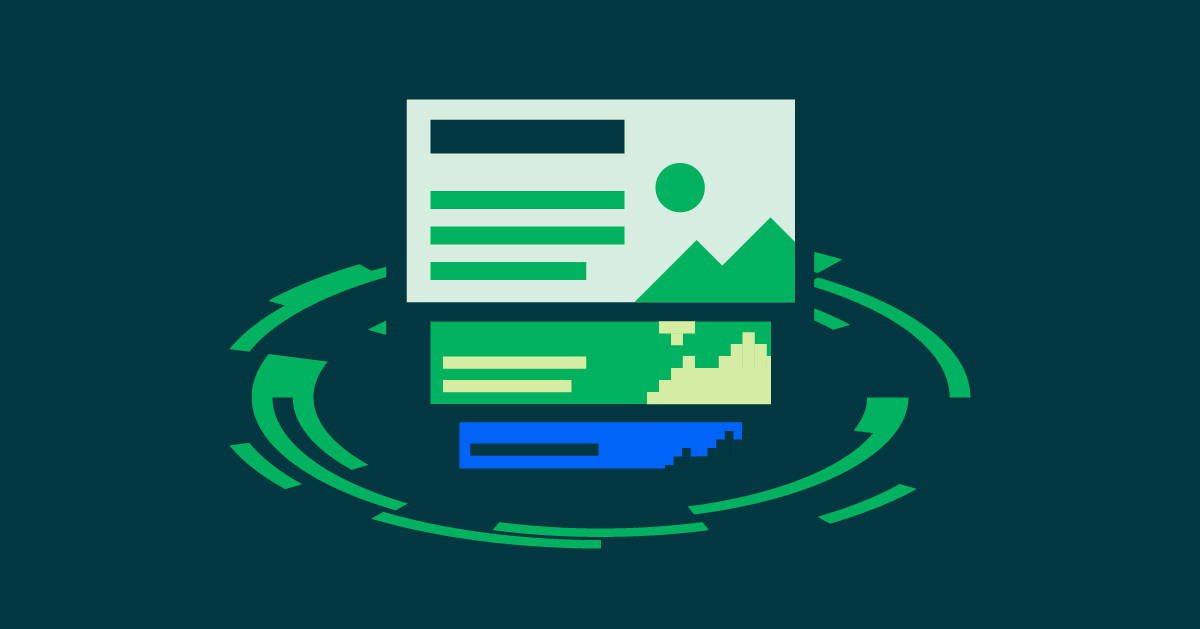- Apr 12, 2021
- --
Digitalization of public administration: future-proof platform for authorities and municipalities
Experience Magnolia in action
Experience Magnolia's key features firsthand in an interactive product tour.
Take a tour nowAn inconspicuous website suddenly became the focus of public interest in spring 2020: the online portal of the Robert Koch Institute (RKI). The RKI is coordinating all federal measures in connection with the coronavirus pandemic. Thousands of authorities, institutions, media and companies accessed daily updated information.
At the same time, many other public institutions had to temporarily restrict their services for citizens. Offices were closed - and digital services were not available. The coronavirus pandemic is shining a spotlight on a familiar topic that has seen little progress for a long time: the digitalization of public administration (e-government) or the public sector.
Authorities, municipalities and public institutions are recognizing the need for action. They are looking for technical solutions to meet citizens' expectations and be prepared for an increasingly digitalized future. What challenges are they facing - and what does the ideal platform for digital administration look like?
Advantages of digital services and information for citizens
Permanent availability regardless of office hours
Fewer staff required for offices and telephone hotlines
Lower costs and resource consumption for paper and shipping
Accelerated application and information procedures for companies and citizens
Image as an attractive commune
Barrier-free access to all services for citizens with disabilities
Rapid provision of important and critical information
The digitalization of the public sector is stagnating
The example of the RKI makes it clear: digitalization of the public sector is not "nice-to-have". The rapid bridging funds for companies would also have been impossible without digital processes: It's hard to imagine hundreds of thousands of applications having to be submitted and processed in paper form.
However, there can be no talk of truly digital administration in Germany. The websites for the applications had to be set up by the federal states within weeks. The RKI also carried out a major update of its content management system (CMS) and website in summer 2020. Under massive pressure from the federal government, the CMS manufacturer delivered a new software version, even though it had not been responsible for further development for years.

Away from the great public interest, little has happened in recent years: this is shown by the annual eGovernment Monitor of the D21 initiative: 54% of Germans used digital administrative services, 44% were satisfied with the digital services offered by the authorities. At least, one might say. However, the study defines the term "e-government" very broadly: it defines, for example, the indication of opening hours or PDF documents for downloading from the website as digital services - not exactly what one imagines modern, digital administration to be.
Only 7% of citizens used digital administrative services more frequently than usual during the coronavirus pandemic, and only 4% used such services for the first time. Most did not visit public authorities during the lockdown. There was simply a lack of end-to-end digital services.
Solutions from the time before digitalization
Why is the digitalization of public administration progressing so slowly? One of the reasons is the digital platforms used to operate the websites and services. Their technological basis often dates back to the 2000s - a different time, when the requirements of a digitized society were still largely unknown: For example, the requirement to manage hundreds and thousands of pages and documents in multiple languages, some of which need to be updated daily.
In addition, authorities and public institutions want to offer digital citizen services via the web and in mobile apps: from online applications to the purchase of parking permits or bus tickets. Information and services should be offered as a single, user-friendly solution via a central portal: a prerequisite for their acceptance.
In principle, digital services and third-party systems can be integrated into any content management system. But what happens if the technology is inflexible and not designed for this? The system becomes more sluggish, more complex, more inefficient, more unstable and more expensive to operate and maintain with every adaptation. Not exactly ideal conditions for getting fit for the digital future - which is only just beginning.
Instead of investing more and more resources in old systems, public authorities and local authorities are opting for a clean break: a new digital platform. What tangible results do they achieve as a result?
Requirements for digital platforms for the public sector
High level of security: protection against cybercrime
Data protection: compliance with GDPR guidelines
Ease of use and accessibility both for editors and administrators
Interfaces: simple connection of third-party systems
Further development and support: long-term support from the manufacturer
Cost-efficient operation: responsible use of taxpayers' money
Digitization of public administration: equipped for the future
myLausanne is the online portal for the almost 140,000 citizens of Lausanne, the fourth largest city in Switzerland. The aim of the platform is to provide all citizens with digital access to the services of the city administration and public utilities. However, the improved service should not result in higher costs. On the contrary: since its introduction, the city of Lausanne has been working more efficiently and has been able to reduce administrative costs.

At the heart of the new digital platform is the Magnolia content management system. After just 12 months of development, the portal went live and all requirements were implemented. This is remarkable when you consider that digitalization projects in the public sector often take years and take a closer look at the scope of myLausanne.
The portal combines static content with data from third-party systems and a huge range of digital services. Citizens can change their data online, submit and track various applications, monitor water and electricity consumption and download consumption bills. With a central log-in (single sign-on), citizens can access all information and services integrated in one platform. Over 70 editors keep the more than 8,000 individual pages of myLausanne up to date.

Other European cities, the Slovenian Ministry of Public Administration and 9 out of 12 Austrian federal ministries now rely on Magnolia. Costs always play a role in the decision - but the main argument is a different one.
Thanks to the open architecture, practically any data source and any third-party system can be seamlessly integrated into the platform. Content and services can be played out via any digital channel. The digitalization of public administration will progress more rapidly; we do not yet know many of the applications and requirements of the coming years. With a flexible, scalable platform, public authorities and public companies can prepare themselves for the digital future - and can be sure that their investments will pay off in the long term.









